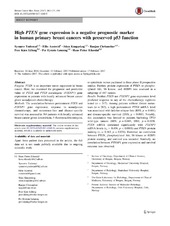| dc.description.abstract | Purpose: PTEN is an important tumor suppressor in breast cancer. Here, we examined the prognostic and predictive value of PTEN and PTEN pseudogene (PTENP1) gene expression in patients with locally advanced breast cancer given neoadjuvant chemotherapy. Methods: The association between pretreatment PTEN and PTENP1 gene expression, response to neoadjuvant chemotherapy, and recurrence-free and disease-specific survival was assessed in 364 patients with locally advanced breast cancer given doxorubicin, 5-fluorouracil/mitomycin, or epirubicin versus paclitaxel in three phase II prospective studies. Further, protein expression of PTEN or phosphorylated Akt, S6 kinase, and 4EBP1 was assessed in a subgroup of 187 tumors. Results: Neither PTEN nor PTENP1 gene expression level predicted response to any of the chemotherapy regimens tested (n = 317). Among patients without distant metastases (n = 282), a high pretreatment PTEN mRNA level was associated with inferior relapse-free (RFS; p = 0.001) and disease-specific survival (DSS; p = 0.003). Notably, this association was limited to patients harboring TP53 wild-type tumors (RFS; p = 0.003, DSS; p = 0.009). PTEN mRNA correlated significantly with PTENP1 mRNA levels (r s = 0.456, p < 0.0001) and PTEN protein staining (r s = 0.163, p = 0.036). However, no correlation between PTEN, phosphorylated Akt, S6 kinase or 4EBP1 protein staining, and survival was recorded. Similarly, no correlation between PTENP1 gene expression and survival outcome was observed. Conclusion: High intratumoral PTEN gene expression was associated with poor prognosis in patients with locally advanced breast cancers harboring wild-type TP53. | en_US |

